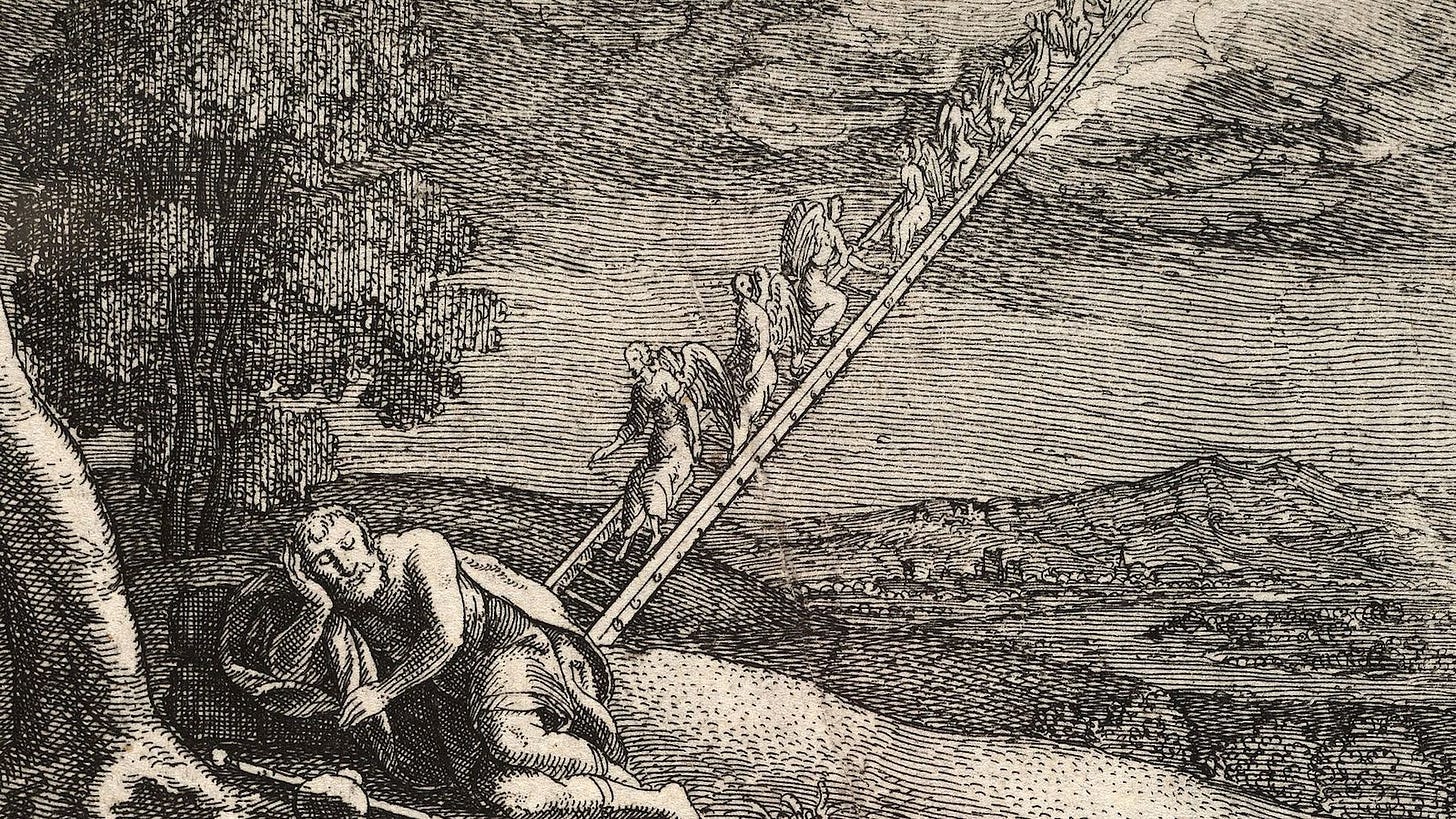From Abraham to Moses
In between covenants
I have said that the covenants are the outline of God’s interaction with man. This is true, but there is sometimes some important material which occurs between covenants, and we need to be familiar with what happened to bring us from one covenant to another. And such it is here, between the Abramic and Sinaitic covenants. Our main focus will be on the covenants, but if I skipped straight from Abraham to Moses, this would be a confusing study indeed.
After the near-sacrifice of Isaac, Sarah and Abraham die (Abraham had several more sons by a second wife), and Isaac becomes the family patriarch. We aren’t going to delve deeply into Isaac’s story, because this isn’t a study of the patriarchs, but we do need to see a few passages of covenantal significance. First, from Genesis 24:6-8 and also 26:2-3, we can deduce that Isaac spent his entire life in the promised land. He did not leave to find a wife (one was brought to him), nor in time of famine (God specifically tells him to stay in the land). So the son born of the promise is in the promised land all his life.
Let’s also look at the covenantal statements made by God to Isaac. They basically reiterate what God said to Abraham, but it is important to trace the path of this covenant as it is transferred down Abraham’s line. In Genesis 26:2-5, God speaks to Isaac.
The Lord appeared to him and said, “Do not go down to Egypt; stay in the land of which I shall tell you. Sojourn in this land and I will be with you and bless you, for to you and to your descendants, I will give all these lands, and I will establish the oath which I swore to your father Abraham. I will multiply your descendants as the stars of heaven, and will give your descendants all these lands; and by your descendants all the nations of the earth shall be blessed; because Abraham obeyed me and kept my charge, my commandments, my statutes and my laws.”
Again, in verse 24, God says, “I am the God of your father Abraham; do not fear, for I am with you. I will bless you, and multiply your descendants, for the sake of my servant Abraham.”
So the promise of God passes through Isaac. All of the elements of the Abramic covenant are maintained: blessing, descendants, land, the blessing of the whole world through Isaac’s descendants.
Isaac has two sons, Jacob and Esau. Esau is the firstborn, but—amazing as it seems—he sells his birthright to Jacob for a bowl of soup. There is a well-known story of Jacob’s trickery following this, but again, this is not a study of the patriarchs. God’s first major covenantal statement to Jacob is found in Genesis 28:13-15. Jacob has a dream of a ladder between earth and heaven, and the Lord is standing above it. He says to Jacob, “I am the Lord, the God of your father Abraham and the God of Isaac; the land on which you lie, I will give it to you and to your descendants. Your descendants shall also be like the dust of the earth, and you shall spread out to the west and to the east and to the north and to the south; and in you and in your descendants shall all the families of the earth be blessed. Behold, I am with you and will keep you wherever you go, and will bring you back to this land; for I will not leave you until I have done what I have promised you.”
It should be clearly understood here that the covenant is being passed from Abraham, to Isaac, to Jacob. There is a specific line of Abraham’s biological descendants who are the inheritors of the covenant, and their descendants will also enjoy the covenant blessings in the future.
There is another important bit about Jacob which cannot be passed over. In Genesis 32, Jacob is traveling with his family and flocks and herds, and he hears that Esau is coming with 400 armed men. Jacob is terrified. Esau had threatened to kill him years before, and Jacob was never the physical type of the two twins. Esau was the tough guy. Jacob has women and children, and livestock. He probably had guards for the livestock, and he may have had a small cadre of armed men, but Esau was approaching with an army. So Jacob sends gifts to Esau, and sends his family across a nearby river, hoping to protect them from Esau.
He then wrestles with a man all night until daybreak. The man puts Jacob’s hip out of joint, but Jacob will not let him go until the man blesses him (always seems like an odd request). The man gives Jacob the name Israel, which can mean “he wrestles with God,” or “God wrestles with him.” Jacob is amazed at the thought that he has been wrestling with God. God reiterates this in Genesis 35:9-12. And so the descendants of Jacob have been known as the sons and daughters of Israel or the nation of Israel ever since. The terms “Hebrew,” “Israel,” and “Jews” have been used interchangeably for Abraham and everyone who followed, but in the text itself, “Israel” refers to Jacob and his descendants, not to Abraham or Isaac. There are no Jews yet at all. That term does not appear until the period of the captivity, more than 1000 years later. Abraham is referred to as a Hebrew, and there is some debate as to the etymology of that term. At any rate, I generally strive to use such terms only as they are used in Scripture, because they tend to be loaded terms which carry certain assumptions with them. If we are to understand Scripture accurately, we should content ourselves with the way words are used in the text itself. “Israel” is a term that the Bible applies to no one other than the descendants of Jacob.
“Israel” is a term that the Bible applies to no one other than the descendants of Jacob.
Jacob has 12 sons: Reuben, Simeon, Levi, Judah, Dan, Naphtali, Gad, Asher, Issachar, Zebulun, Joseph, and Benjamin. These will be the fathers of the 12 tribes of Israel. The wonderful story of Joseph (Gen 37-50) leads us down into Egypt, where Jacob and his sons settle toward the end of Jacob’s life. There is no written scripture indicating any specific covenantal statement directly from God to any of the 12 brothers, but there are significant points in Jacob’s blessing on them, which are prophetic, and indicate God’s activity in their future. These blessings are found in Genesis 49. Some of them indicate where in the land a certain tribe will dwell, some have more to do with what that tribe will do or be known for. It is also important to note that Joseph has two sons, Ephraim and Manasseh, and Jacob blesses them as if they were his own (Gen. 48:5, 15-16, 20). So Joseph will inherit a double portion of the land, as it were, according to the covenant with Abraham, Isaac, and Jacob.
And so the sons of Israel are in Egypt. Over time, they will become enslaved there, and that leads us into the next covenant.



